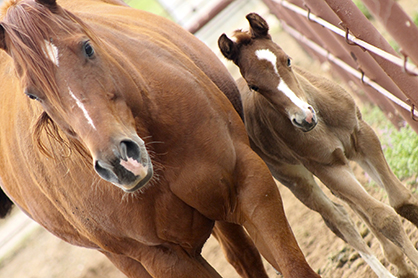AAEP Publishes Contagious Equine Metritis Guidelines

AAEP
Comprehensive guidelines to assist veterinarians with identification, diagnosis and control of Contagious Equine Metritis (CEM), a non-systemic venereal disease of equines that causes short-term infertility in mares and rare abortion, are now available on the AAEP’s website.
Six outbreaks of CEM have occurred in the U.S. in the past 15 years, including a significant outbreak in 2008-2010 in which over 1,000 exposed horses in 48 states were required to be tested, resulting in 23 contaminated stallions and five infected mares ultimately identified and treated.
“Outbreaks in the U.S. have demonstrated the risk of incursions and the need for surveillance in the active breeding population to identify cases early and limit disease spread,” said guidelines co-author Dr. Abby Sage, Richmond staff veterinarian for the Virginia Department of Agriculture and Consumer Services. “Several of these outbreaks also demonstrated significant stallion-to-stallion spread of Taylor equigenitalis via fomites and inadequate biosecurity during semen collection and stallion handling.”
Dr. Sage and co-author Dr. Peter Timoney, the Frederick Van Lennep Chair in Equine Veterinary Science at the University of Kentucky’s Gluck Equine Research Center, advise equine practitioners and stallion owners/managers to follow stringent biosecurity protocols when collecting and handling stallions and consider implementation of annual testing of active breeding stallions prior to breeding season as ongoing assurance of disease freedom.
CEM is an internationally reportable disease. When the carrier status of a stallion or infection of a mare is suspected, practitioners should contact their state and/or federal animal health official, who will provide current collection and response procedures for suspect cases.
The CEM Guidelines were reviewed and approved by the AAEP’s Infectious Disease Committee and board of directors. View the guidelines or save them to your mobile device for future reference at https://aaep.org/document/contagious-equine-metritis.
Besides CEM, AAEP guidelines for 22 additional equine infectious diseases are available at https://aaep.org/guidelines/infectious-disease-control/using-guidelines. In addition, three foreign animal disease guidelines can be found at https://aaep.org/infectious-disease-control/foreign-animal-disease-guidelines.
About AAEP
The American Association of Equine Practitioners, headquartered in Lexington, Ky., was founded in 1954 as a non-profit organization dedicated to the health and welfare of the horse. Currently, AAEP reaches more than 5 million horse owners through its over 9,000 members worldwide and is actively involved in ethics issues, practice management, research and continuing education in the equine veterinary profession and horse industry.










